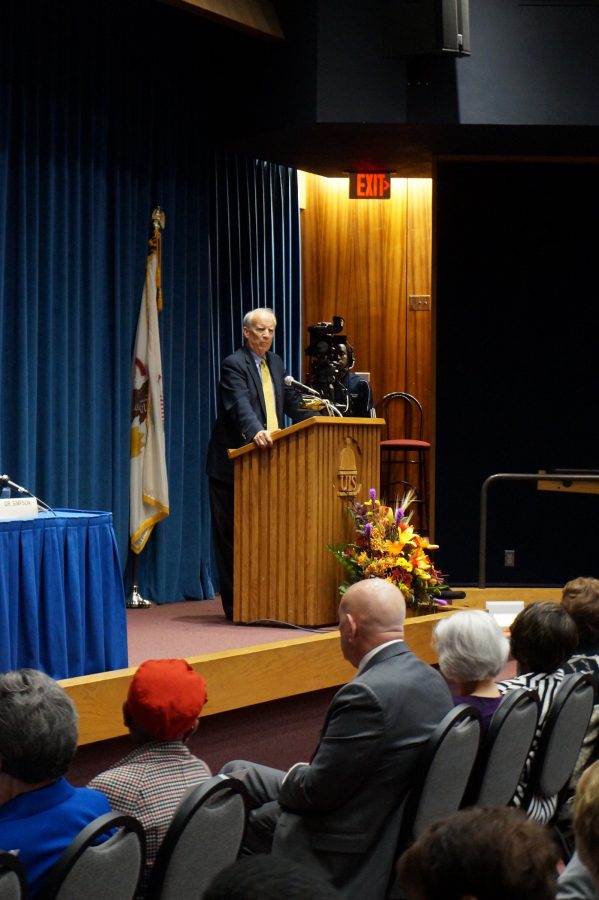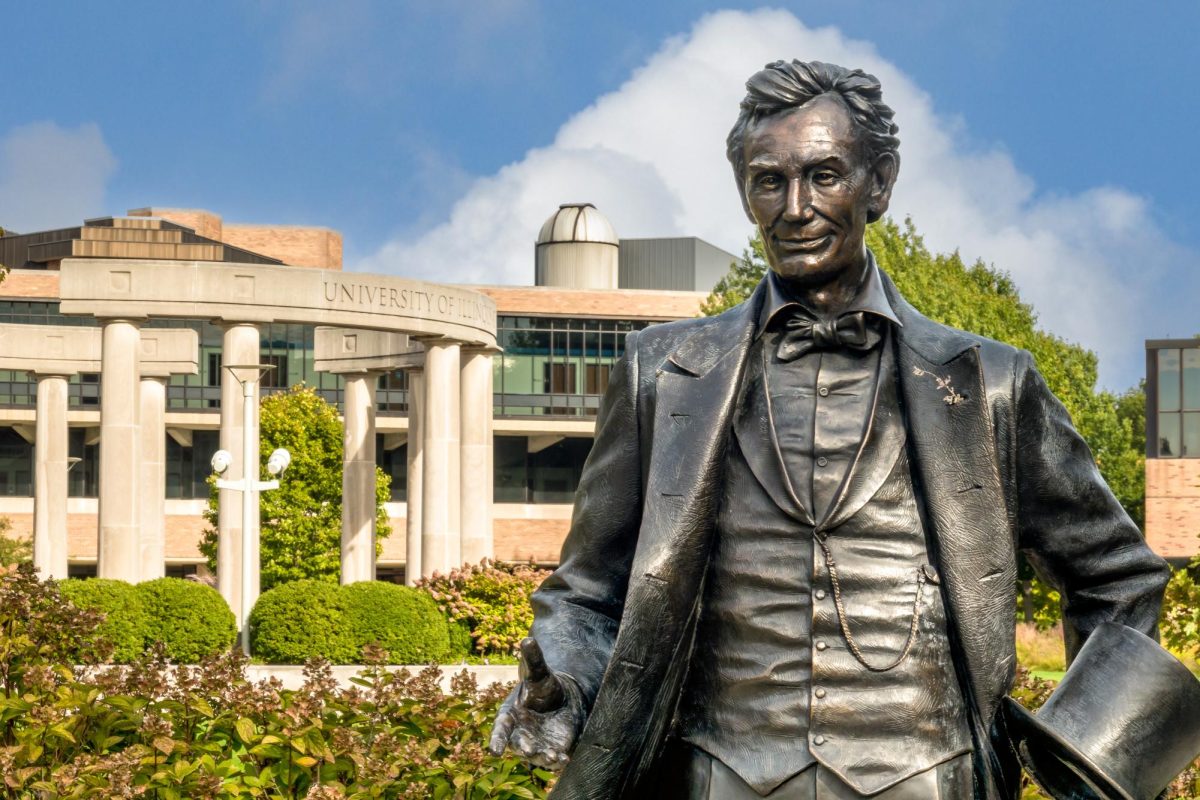14th annual Lincoln Legacy Lecture Series: Lincoln & Reconstruction
Photograph courtesy of Tiffany Chin
Dr. Michael Burlingame speaks at the 14th annual Lincoln Legacy Lecture Series.
October 26, 2016
The 14th annual Lincoln Legacy Lecture Series for UIS premiered on Oct. 20 in the Brookens Auditorium.
The lecture, entitled “Lincoln & Reconstruction: America’s Struggle for Equality,” highlighted Abraham Lincoln’s presidency and the struggles for equality that society faced during this time as it relates to today’s issues in society regarding race relations and the changes that should be made to ensure stable and long-lasting policies for the United States.
Also featured in this lecture were explanations of the Reconstruction efforts for the Union by Lincoln and his successor, Andrew Johnson, and how the death of Lincoln during this crucial time has impacted history.
Chancellor Susan Koch was in attendance for the annual lecture series, introducing three distinguished guest speakers: Dr. Michael Burlingame, Chancellor Naomi B. Lynn distinguished chair in Lincoln studies at UIS; Dr. Brooks Simpson, foundation professor of history at Arizona State University; and Dr. Allen Guelzo, Henry R. Luce professor of the Civil War era at Gettysburg College – whose speech was featured at the lecture, though he was unable to attend.
During this event, all of the guest speakers pondered the possible outcome of America’s history had Lincoln not been assassinated at such a crucial time in his presidency.
Starting off the event, Burlingame specifically examined the variances of the Reconstruction efforts between Lincoln and Johnson, noting the possible outcomes under each politician and the policies they established.
Burlingame looked at the plans and procedures that each implemented and shared that both Lincoln and Johnson had very similar plans in place to unite the Union. Johnson, however, had very differing views toward race relations, believing that African Americans at the time did not deserve suffrage and other basic rights granted to United States citizens.
While it is difficult to determine the outcome of the Reconstruction Era under Lincoln, Burlingame felt that the Reconstruction efforts were greatly hindered under former President Johnson due to the instatement of black codes and other oppressive policies pushed on minorities during a time when the Union was divided by the tension caused by race relations between the Northern and Southern states.
While Johnson’s implementation of racial policy may have hindered the rebuilding of states into the Union, it is difficult to determine whether any of Lincoln’s policies would have been successful, as possible outcomes can only be based through assumptions. However, some scholars believe that Lincoln’s untimely death saved his reputation, as the states were heading into one of the toughest and most crucial points of American history.
According to Guelzo, the Reconstruction Era, which occurred between 1865 and 1877, was the “ugly duckling of U.S. history” that proved to be a very difficult issue to solve.
It was nearly impossible to appease all individuals in the country due to the widespread division between radical groups and other political parties. Some parties felt that the Reconstruction efforts were forced on them, similar to the actions of a dictator, while others saw the policy as a “pure bourgeois revolution.”
Furthermore, the economic impact of Reconstruction hurt some while improving the livelihood of others. Despite these difficulties, both Lincoln and Johnson pushed to unite the states once again.
Simpson elaborated on each president’s efforts to rebuild the Union. According to Simpson, Lincoln never had a clear-cut plan of how to establish the Union, but wanted suffrage and equal rights granted to African Americans in the country.
Meanwhile, Johnson was tasked with examining the policies set by Lincoln and creating new plans for the Union, even though Johnson had opposing views with Lincoln regarding race relations.
Simpson explained that, during this time, one would have had to reconcile with the white southerners, meaning that one would have to appeal to their racist views while also protecting the rights of all citizens within the nation in order to build a stronger Union. Unfortunately, no historian, according to Simpson, has found a successful way to handle these problems which Lincoln and Johnson faced during that time because the possible outcomes of certain policies are purely speculative.
Simpson believes that the greatest failure of Lincoln was colonization of the Union.
Lincoln wanted to unite the country and dedicated the last days of his presidency to rebuilding the nation, but was ultimately unsuccessful due to his push for change in such a short period of time.
These efforts prove how difficult it is to create a stable, long-lasting change when pushing forth policies so quickly due to the impatience of individuals and society. Simpson closed the lecture by stating, “We cannot judge history for these problems, when it is so difficult to solve for ourselves.”
At the completion of the event, a reception with free food was provided along with a book signing by members of the distinguished panel.













